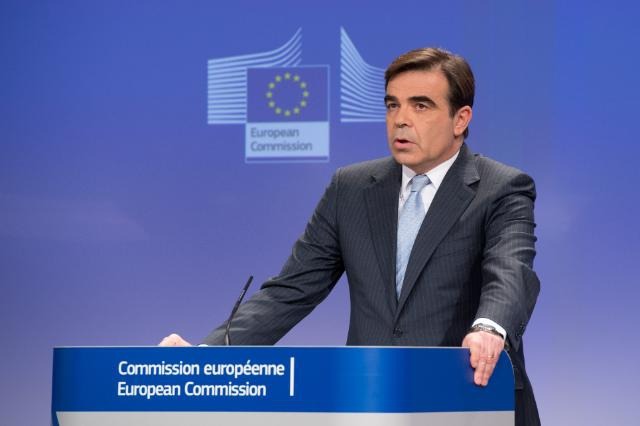At a press conference today (22 July), the European Commission Chief Spokesperson Margaritis Schinas told an audience of journalists that the Commission is closely monitoring the situation on the ground in Turkey with its partners in UN, the Council of Europe, Greece and Turkey.
He declined to respond to questions whether the new emergency measures in Turkey, in particular its suspension from the European Convention on Human Rights, require a reassessment of whether Turkey could still be considered a safe third country for returning asylum seekers from Greece and repeated the same answer in English and French.
Schinas said that the Commission was aware of the recent wave of arrests and repression in Turkey and referred to the “clear” statement yesterday (21 July) by High Representative/Vice-President Federica Mogherini and Commissioner Johannes Hahn on the declaration of the state of emergency in Turkey.
This statement “comes in the wake of the recent unacceptable decisions on the education system, judiciary and the media”. . . The two Commissioners “call on Turkish authorities to respect under any circumstances the rule of law, human rights and fundamental freedoms, including the right of all individuals concerned to a fair trial.”
Judging by Schinas’ somewhat evasive replies, the Commission maintains for the time being its position since the beginning of May, when it issued an optimistic report on the progress made in the implementation of the EU-Turkey visa liberalisation roadmap and notified Greece that it considered the legal framework in Turkey as regards refugee asylum satisfactory.
"We don't intend to improvise a new position on this issue," he said.
No doubt the EU-Turkey agreement on stemming the flow of refugees and migrants from Turkey to Greece has delivered results and the Commission can claim, as it did in a report in mid-June, that the business model of smugglers has been broken.
Whether Turkey will meet the few remaining benchmarks for visa liberalization is another matter. Turkey was required “to revise the legislation and practices on terrorism in line with European standards”. How likely is this to happen in the current situation after the failed coup in Turkey?
According to Schinas the visa liberalisation process is not put on hold and the Commission expects that the two sides will reach an agreement on a narrower definition in the Turkish law on terrorism so that journalists and writers will not risk being arrested for what they are writing. Such an agreement could be achieved after the summer break.
A journalist tried to induce Margaritis Schinas to reply to a “technical” question as to whether the Commission intends to send monitors to Turkey. Obviously there is no need for that. “We have a delegation in Turkey and partners there – we aren’t alone,” Schinas replied.
In the wake of the failed military coup last week, the Turkish government has declared a state of emergency, expected to last up to 45 days. It gives the state the power to bypass the parliament and pass new laws.
Turkey has also suspended the European Convention on Human Rights, which among others forbids death penalty.
Since the failed coup, the Turkish government has arrested and dismissed or suspended thousands of judges, prosecutors, military staff, police officers, teachers and academics, accusing them for having being involved in the coup or having links with the exiled cleric Fethullah Gulen, who is accused of being behind the coup.
At a joint press conference on 18 July with the US Secretary of State John Kerry, EU foreign policy chief Federica Mogherini said that EU is following “the developments regarding the State of Emergency Turkey has declared after the attempted coup, which EU condemned, very closely and with concern.”
“No country can become an EU Member State if it introduces death penalty. This is very clear in our acquis,” she said.
Since then the situation in Turkey, as regards human and political rights, has rather deteriorated with the latest announcements by the Turkish government. Instead of reaching out to his political opponents, who supported him against the coup, the Turkish president seems to use the coup as a pretext to crack down on real and imagined opposition.
“A failed coup in Turkey does not mean that democracy wins,” Roger Cohen wrote in the International New York Times (18 July), expressing concerns of policy experts on Turkey.
M. Apelblat
The Brussels Times
“We are monitoring the situation in Turkey”

